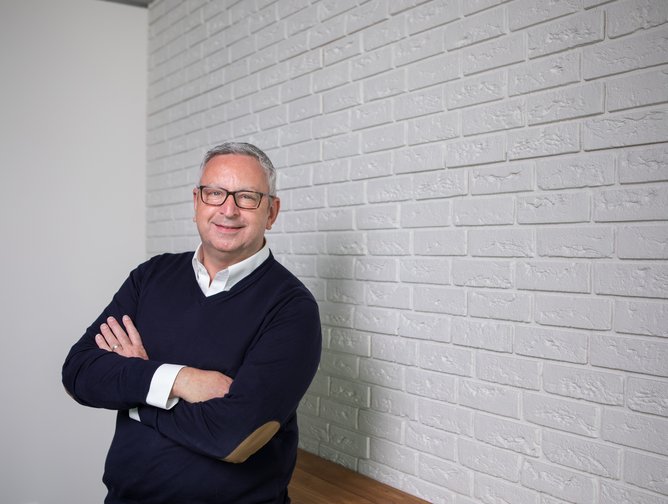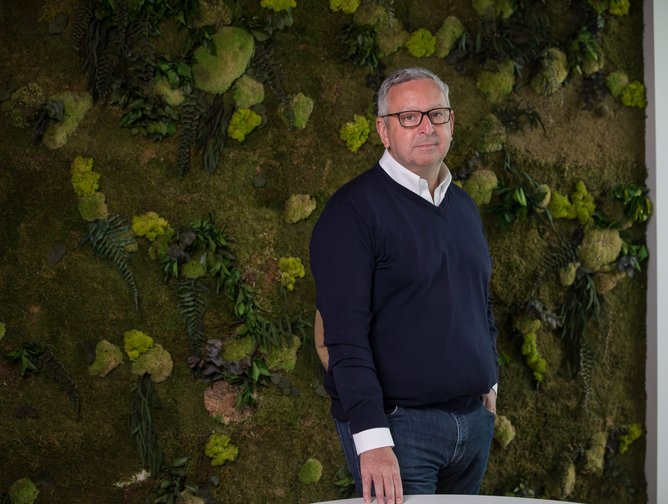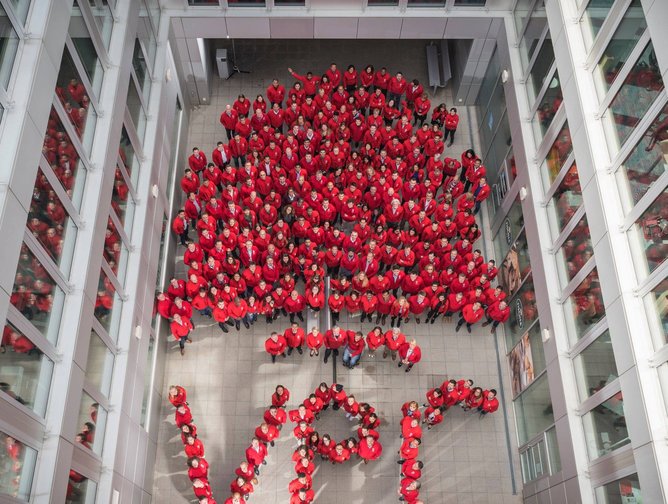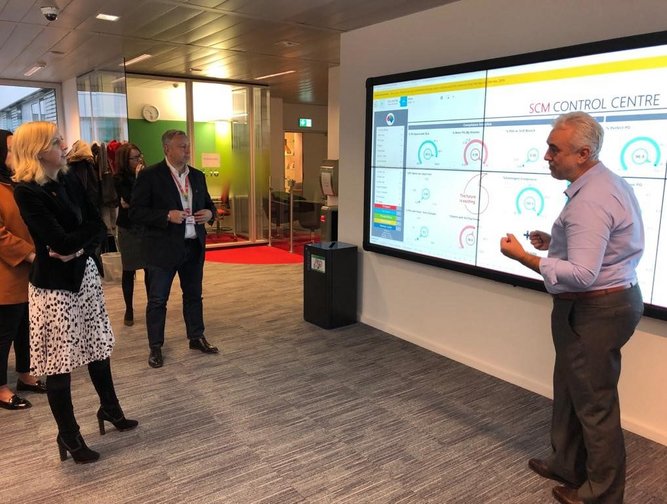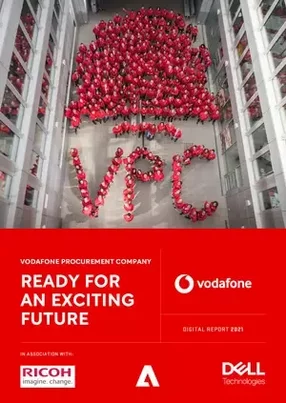There is nothing like chatting to a procurement leader with a 30-year career under his belt who still gets infectiously excited by the industry. That’s Ninian Wilson, Group Procurement Director of Vodafone and CEO of its subsidiary, the Vodafone Procurement Company, who visibly lights up when talking about procurement being in the spotlight and the technology that is shaping its ongoing transformation. Or, maybe, he’s in a particularly good mood because his beloved Scotland just beat old rivals England at rugby – the first time that has happened in England for 38 years.
Of Scottish origin, Wilson is speaking to us from his home office in Luxembourg. Home working is just one aspect of the Covid-19 pandemic that has impacted Vodafone, from both a business and customer perspective. And where there is disruption, there is opportunity. And when you’re Ninian Wilson with €24 billion to spend on behalf of Vodafone, and also responsible for all supply chain operations, opportunity is around every corner.
“I'm overall responsible for our procurement activity across four categories of spend,” says Wilson. “The total spend is about €24 billion euros and that's split across networks, indirect spend, content, and obviously devices.
“We always think about the cost savings we've made and, and the spend value coming down as we do more and more work with our internal clients, but also we've made a number of acquisitions. So that spend base has been broadly stable over the last few years, even with buying and selling of companies.”
The spend may not have changed significantly in recent years – Wilson joined Vodafone 12 years ago – but the manner of the procurement process certainly has. That digital transformation story started around 5 years ago and, like many great developments, was born of frustration.
Wilson is the first to admit he was trying to get data and information which was not as simple then as it may now sound. kind of hard to get. Out to showcase the digital opportunity to his then boss Nick Reed (now the Group Chief Executive), Wilson and his team set about digitalising the supplier performance scorecard.
“From that initial scorecarding, we then worked really hard on some of our P2P processes and digitising all that work and creating scorecards and dashboards in near real time for all of that activity,” says Wilson. “So we started around, strategically, how are we doing? And then we digitised the back and now our focus has shifted to what we call ‘autonomous sourcing’, which is going to be the next sort of quantum leap in procurement – procurement that runs itself with almost no human intervention.”
Before any procurement professionals drop their mugs of coffee and reach for something a tad stronger, Wilson is not suggesting for one minute that the human role and input will become obsolete – far from it. However, what we will see is a streamlining of processes, leaning on data, artificial intelligence and machine learning to automate certain tasks to provide the best outcomes.
“Our jobs all change over time when we get new tools and it wouldn't apply to everything we do,” says Wilson. “But if we think of the vendor selection piece, a tool or a capability that looks at the internet can bring in some suppliers, probably picks a few common ones, create the tender document, send it out, do the balanced scorecard evaluation at the end.
“This'll be a cool bit if we get it to do the negotiation, then put it into a contract, and uploads pricing information into our ERP system. That's what we're calling autonomous sourcing. We're currently building that to go live with our POC at the end of April.”
It’s certainly an exciting time to be working in supply chain and procurement right now. Can anyone remember a time when supply chain in particular may be leading the news agenda? And while nobody would have wished for the causes of this particular focus (the global shutdown and inevitable pivot caused by the pandemic), it’s good to see that the people responsible for ensuring that everything ran so magnificently for years are now being recognized. Just as scientists are once again trusted experts and key workers applauded from our doorsteps, supply chain specialists are here to solve our fundamental needs – from food to Pfizer-BioNTech.
Is 2021 procurement’s time to shine?
“It's probably the second S curve that we've been on as a function, with the first around e-procurement in the 2000s,” says Wilson. “I think we're genuinely on the second S curve due to probably three drivers. We mentioned autonomous sourcing, machine learning, and artificial intelligence becoming real and deployable in business as usual activities.
“And yes, supply chains have come into very sharp relief through the pandemic because, you know, does your supply chain work? Does it work in a pandemic? Is it resilient? Will it continue to be resilient? And I, for one, I've never had more airtime with the executive team here at Vodafone – you are high profile as a supply chain function right now. I think it’s a tremendously exciting time, a lot of risk to manage, but a lot of new things coming as well.”
The Vodafone Procurement Company -VPC - was well prepared for the pandemic when it really hit home. A lot of digitisation work had already been done. Within three weeks of the company experiencing its first case close to the business, they moved 98,000 working from home. So one of the big learnings was their investment in digital was how that helped them continue.
Wilson also recalls back in December 2019 that some Chinese partners mentioned, during a coffee break in London, that something ‘really bad was happening’ in a place called Wuhan. VPC set up a crisis team in early January to start managing the supply chain, especially for consumer products.
“While we had a few blips in the supply chain, we've managed that as a company really well,” says Wilson. “One of the key learnings is really understanding your supply chain and how resilient your supply chain is.”
Which brings us around nicely to Procurement With A Purpose – an initiative introduced to place purpose at the centre of how Vodafone runs the business.
This means making it central to investment decisions, how they operate and how they engage with stakeholders, whether they're customers, NGOs, or governments.
“Our purpose strategy for the company is based on three pillars,” explains Wilson. “One is helping society become more digital – everybody can see during the pandemic that's a good thing to do. The second pillar is around diversity and inclusion, both in the workplace but also in our supply chain. And then the third pillar is around planning. And we think there's a fundamental opportunity for both our company Vodafone, but also for supply chains to really reinforce the point that we've only got one planet.
“I think if you're in supply chain and there's an opportunity to drive some real systematic change, then I think we should take it – and we've taken that opportunity. Our tender documents now have 20% of the scoring based around purpose. So we're not just talking about it, we're actually putting it into tenders because we know if we do that then over time it will change behaviours.
“It's not a magic bullet, but our partners will learn that if they do more on these pillars, they will score higher and win more business. And that allows us to translate that purpose vision during the supply chain.”
Key Partners
Being a global telecommunications giant means Vodafone inevitably works with household-names from the consumer technology world. That obviously means Google, Facebook, Apple, while Amazon Web Services (AWS) and Oracle are “key partners for Vodafone”.
The company also works with infrastructure partners including Nokia, Ericsson, Huawei and Cisco. On top of those, Wilson estimates Vodafone works with around 11,500 suppliers across the group. However, when considering organisations that are helping Vodafone to transform supply chain, then Wilson highlights some strategic partners that are of particular significance.
“There's probably four or five partners who are really important to us,” he says. “First of all, we have a real strategic relationship with SAP and SAP has become the backbone for a lot of our digital enablement within supply chain – whether it's inventory management, PO processing, or actually helping us work through awarding tenders. So SAP Ariba is there. Above that, we're using S/4HANA, which holds all of our data, but then what we've done is built niche products on top of that, to make sure that we could really capitalise on tools that help us visualise performance.
“We pull that data from S/4HANA and we then visualise it with a tool called Celonis – a German unicorn. It's a fantastic company to work with. And they've really helped us visualise all of our key metrics and scores, both on compliance and efficiency.
“The second to the company we've worked with is SirionLabs. They helped us with commercial contract management, capturing the KPIs and making sure those are presented in the correct way. And also that we actually do manage the contract after the award, which is sometimes a bit of an Achilles heel for procurement.
“We've also just resigned with Vizibl – an SRM tool. They provide information and data on your strategic relationships. So if we have a strategic relationship say with Microsoft then all of the data – what we buy from Microsoft, what we sell to Microsoft, what we do together – will be hosted in that tool and made visible to all key stakeholders. One of the challenges in, in distributed companies is keeping everybody joined up with where you are on key relationships, so Vizibl keeps everybody joined up, but also tracks progress against some key initiatives which we've got with each of those partners.”
Smarter data analytics
Vodafone uses a wealth of smart tools to provide unprecedented visibility, transparency and increased efficiencies based on data, but what if you could take that to the next level with predictive analytics? Having that historical database helps to look ahead to potential problems or to reduce inefficiencies.
Wilson talks about getting to a point where he may even be able to predict contract failure. While admitting those advanced analytics are not quite there yet, disruption like Covid-19 highlighted the need to assess and mitigate risk in the supply chain. That not only means being wary of companies that may be at risk of failure, but also supporting those that need it most by perhaps purchasing more inventory or adjusting payment terms.
And you've got 12,000 vendors. It's moderately difficult to answer. So I'd like to have all of that analytics in place where I can know, see I'm touching a button.
“I think that becomes the new frontier for procurement,” says Wilson. “You should be doing machine learning, you should be doing artificial intelligence, but predictive is kind of cool if we can get there. Some companies are doing the cool bits of predictive. We saw some great work by Bob Murphy from IBM. I think there's a huge opportunity for us in predictive analytics, especially when you get into physical supply chain operations.
“We will be making some more digital investments to make sure that we maintain that resilience and build upon it over the next two to three years.”
All of this brings us nicely to Wilson’s ambition to make Vodafone the best procurement function in the world and create sustainable competitive advantage for the company.
Our aim is to be the best procurement function in the World and create sustainable competitive advantage for Vodafone. But the billion-euro question is, how do you achieve that? And what does it actually look like?
Wilson is modest in his assessment of current performance when it comes to where they ultimately want to be in terms of innovation. He says on a good day, his team are scoring 6.5 out of 10. On a bad day, that might be a straight 6.
“More than anything, it's a mindset around excellence and wanting to be the best at what you do,” he says. “We try and get everybody in the team to be at their best and we try and develop tools and technologies to help support them. Are we there at the moment? No. Are there companies and sectors that are way ahead of us? Absolutely. So we've got a tremendous amount of work still to do.
“You've got to have a digital first mentality – you've got to really think about how you can digitise what we do. One of the other technologies we use to sign contracts is DocuSign. It's really simple. You go in and you click it, you point and you put your signature right here. And I was sitting thinking this morning, we also have our compliance sheet on the front of it. So you look through the compliance sheet and see if you're happy. But I was thinking if I've got a compliance sheet and everything is positive, why am I actually spending time going and clicking and putting my signature on it and why isn't that completely AI and automated right through? And if that was automated and, given we sign off 3,500 contracts per annum at the Vodafone Procurement Company, how long does it take to do that?
“So I'm trying to think of the productivity gain. And then I'm trying to think if I got that extra time for me or my direct reports could be running more workshops with some of our key partners around how we can add more revenue together. So that's how I'm trying to think of the operational excellence question.
“I think you've got to be excellent in supply chain and you've got to have all of your processes really nailed because if you don't have that excellence at an operational level, how can you actually step up and add more value to the business?”
“So I think you'll never get me above 6.5 out of 10. The moment you think you're 8 or 9 is the moment you start going backwards.”
Future of Procurement
Throughout our interview, Wilson comes across as amiable, energised and a man who has a clear vision of his global operations – both now and in the immediate future. If events of the last 12 months have taught us anything, it’s that anything can happen, and probably will at some stage. So how do you plan for the future and try to use predictive analytics in times like these? For Wilson, it’s about setting out clear priorities and ambitions.
“For us in supply chain for the next 12 to 18 months, there are three clear priorities,” he says. “Number one is the transformation of our physical logistics operation. So we're going to build a European platform, Sub-Saharan platform and completely transform how we work with partners and how they supply product to us.
“Number two is autonomous sourcing. We think that's coming, and we will have a POC up and running by the end of April and will invest in that. And then the third area for us is really thinking about how new buying models evolve. So I'm pretty convinced that the world's going to end up a number of different marketplaces and part of the CPO’s job or the category manager's job will be figuring out which marketplace they want to connect with to get best value, and then how their analytics platforms will help them actually make those decisions.”
“It's not easy to do, but it must be doable to actually get to that position.”
